Unit 5 Educational exchanges-Grammar现在完成时课件(共37张PPT)
文档属性
| 名称 | Unit 5 Educational exchanges-Grammar现在完成时课件(共37张PPT) |
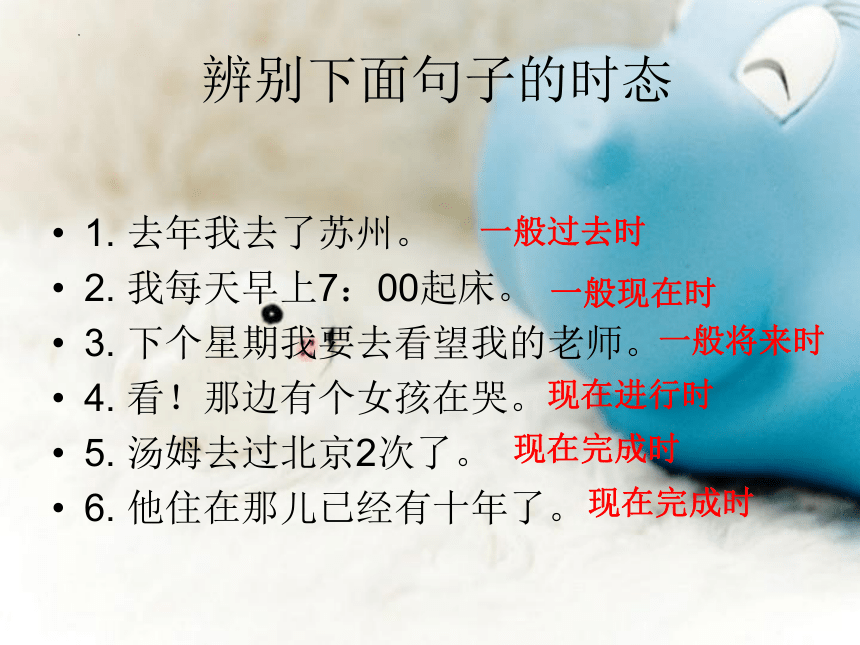
|
|
| 格式 | zip | ||
| 文件大小 | 184.2KB | ||
| 资源类型 | 教案 | ||
| 版本资源 | 牛津深圳版 | ||
| 科目 | 英语 | ||
| 更新时间 | 2022-08-10 06:40:38 | ||
图片预览

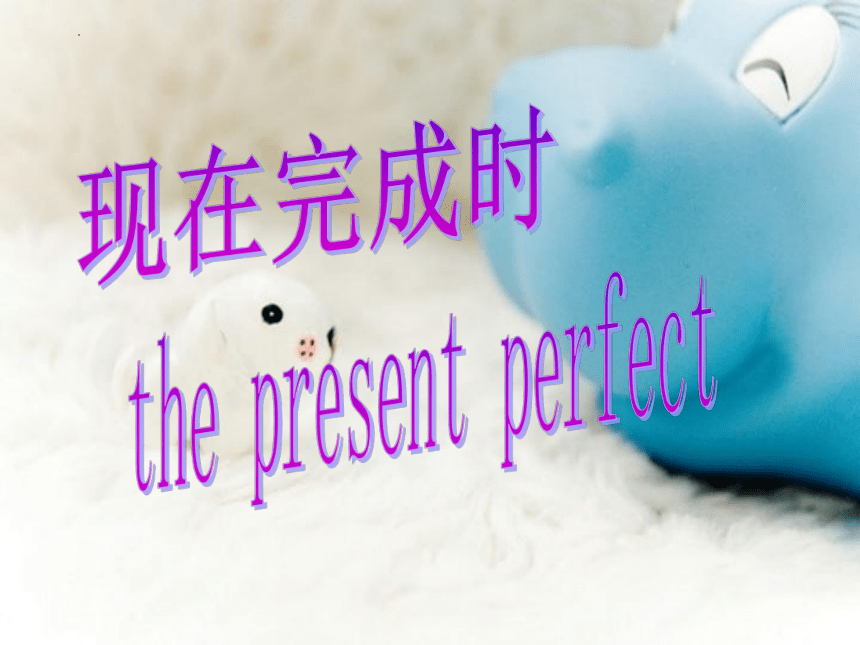
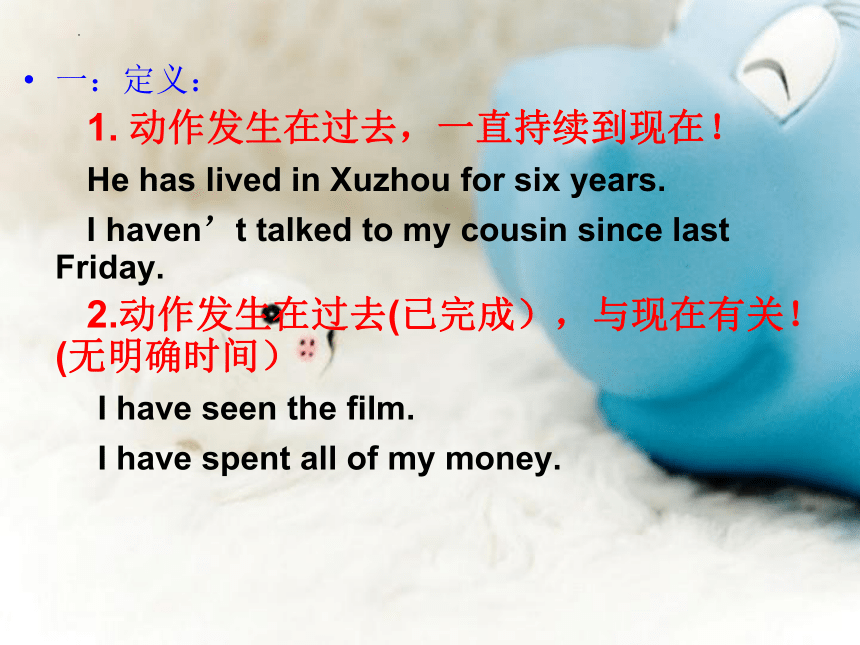
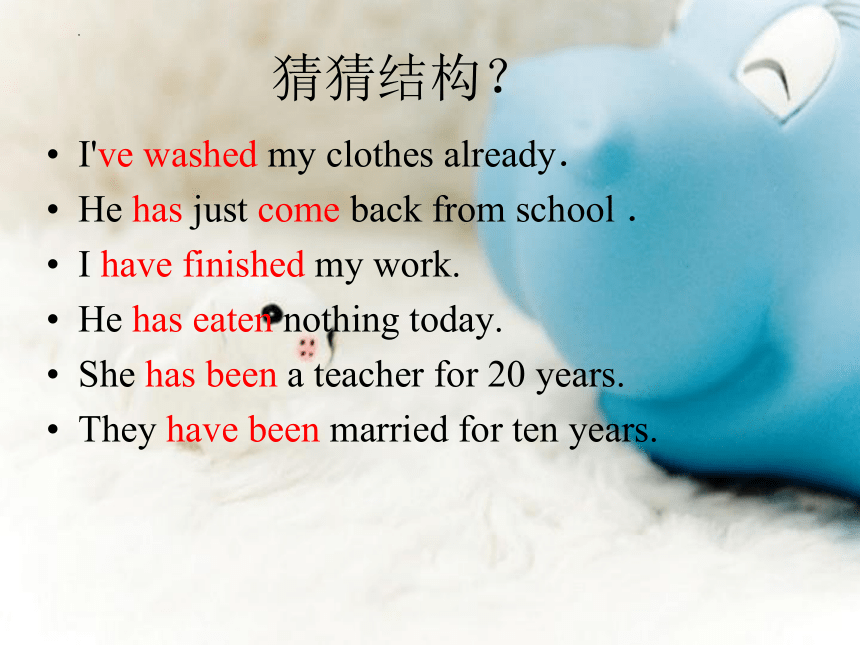



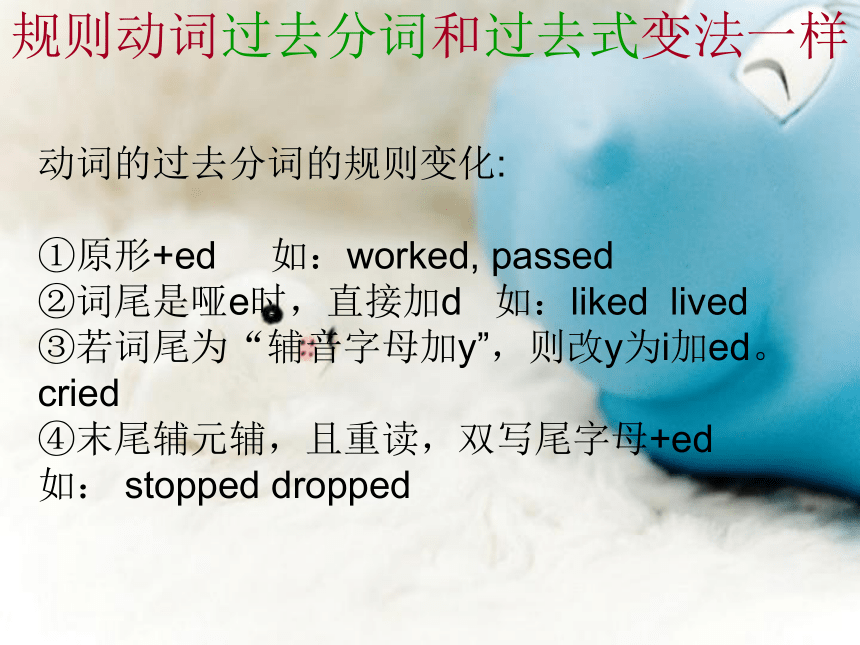

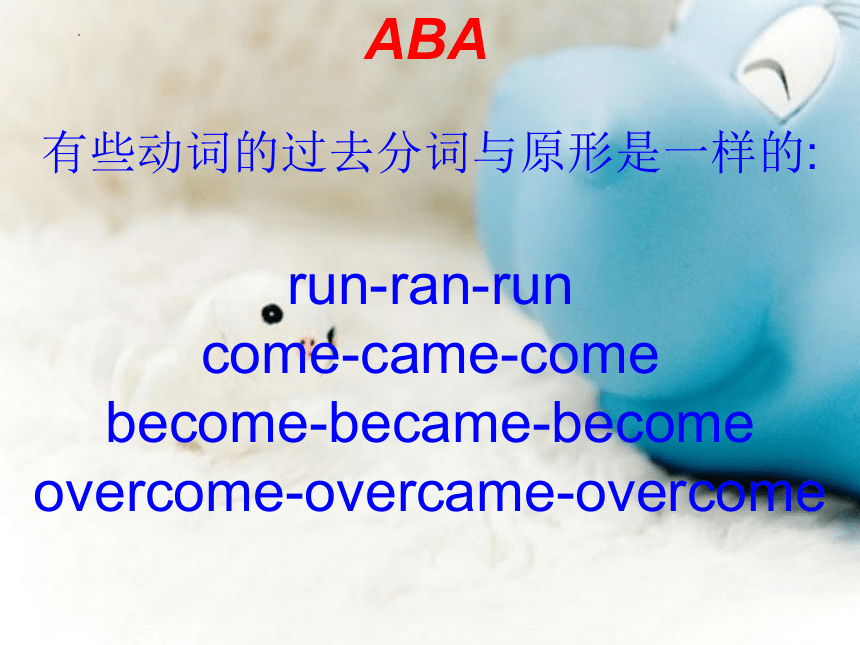
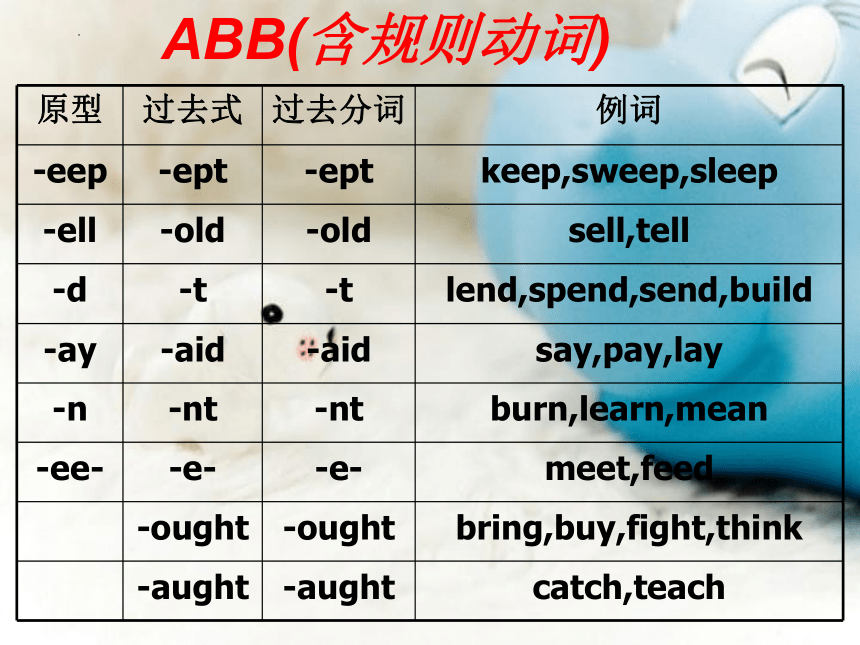

文档简介
(共37张PPT)
辨别下面句子的时态
1. 去年我去了苏州。
2. 我每天早上7:00起床。
3. 下个星期我要去看望我的老师。
4. 看!那边有个女孩在哭。
5. 汤姆去过北京2次了。
6. 他住在那儿已经有十年了。
一般过去时
一般现在时
一般将来时
现在进行时
现在完成时
现在完成时
现在完成时
the present perfect
一:定义:
1. 动作发生在过去,一直持续到现在!
He has lived in Xuzhou for six years.
I haven’t talked to my cousin since last Friday.
2.动作发生在过去(已完成),与现在有关!(无明确时间)
I have seen the film.
I have spent all of my money.
猜猜结构?
I've washed my clothes already.
He has just come back from school .
I have finished my work.
He has eaten nothing today.
She has been a teacher for 20 years.
They have been married for ten years.
二:肯定句结构
主语+has/have + 动词的过去分词
!!!
我要开始变形啦
!!!
三:
动词变化
规则动词过去分词和过去式变法一样
动词的过去分词的规则变化:
①原形+ed 如:worked, passed
②词尾是哑e时,直接加d 如:liked lived
③若词尾为“辅音字母加y”,则改y为i加ed。cried
④末尾辅元辅,且重读,双写尾字母+ed如: stopped dropped
不规则动词的过去式以及过去分词
巧记规律
AAA: put– put –put let—let –let
ABA: become—became—become
ABB: stand—stood—stood
ABC: eat— ate—eaten
有些动词的过去分词与原形是一样的:
run-ran-run
come-came-come
become-became-become
overcome-overcame-overcome
ABA
原型 过去式 过去分词 例词
-eep -ept -ept keep,sweep,sleep
-ell -old -old sell,tell
-d -t -t lend,spend,send,build
-ay -aid -aid say,pay,lay
-n -nt -nt burn,learn,mean
-ee- -e- -e- meet,feed
-ought -ought bring,buy,fight,think
-aught -aught catch,teach
ABB(含规则动词)
ABC
原型 过去式 过去分词 例词
-eak -oke -oken break,speak
-eal -ole -olen steal
-ear -ore -orn wear,bear,tear
-ow(aw) -ew -own grow,blow,know,
throw,draw
-i- -a- -u- sink,swim,drink,ring,
sing,begin
-i- -o- -n drive,rise,ride,write
ABC
有些动词的过去分词是在原形词尾加n或en.
take-took-taken give-gave-given
fall-fell-fallen eat-ate-eaten
write-wrote-written speak-spoke-spoken
freeze-froze-frozen ride-rode-ridden
get-got-gotten forget-forgot-forgotten
特殊:
am/is-was-been are-were-been,
do (does)-did-done go-went-gone
see-saw-seen show-showed-shown (showed)
lie-lay (lied)-lain (lied)
(背诵)不规则动词变化:
A---A--A
cut cut cut
put put put
read read read
let let let
shut shut shut
cost-cost-cost
set-set-set
beat-beat-beat
hit-hit-hit
hurt-hurt-hurt
spit-spit-spit
rid-rid-rid
结尾字母一般是t或d。
特殊:动词read的过去式和过去分词虽然词形与原形一致,read-read-read,但发音分别是[ri:d]-[red]-[red]。
keep-kept-kept
sweep-swept-swept
sleep-slept-slept
sell-sold-sold
tell-told-told
lend-lent-lent
spend-spent-spent
send-sent-sent
build-built-built
lay-laid-laid
say-said-said
pay-paid-paid
A--B--B
catch-caught-caught
teach-taught-taught
have (has)-had-had
leave-left-left
lose-lost-lost
make-made-made
feel-felt-felt
spell-spelt-spelt
stand-stood-stood
understand-understood-understood
find-found-found
hear-heard-heard
bring-brought-brought
buy-bought-bought
fight-fought-fought
think-thought-thought
shine-shone-shone
break-broke-broken
speak-spoke-spoken
steal-stole-stolen
wear-wore-worn
bear-bore-born
tear-tore-torn
grow-grew-grown
blow-blew-blown
know-knew-known
throw-threw-thrown
draw-drew-drawn
fly-flew-flown
A---B--C
sink-sank-sunk
swim-swam-swum
drink-drank-drunk
ring-rang-rung
sing-sang-sung
begin-began-begun
rise-rose-risen
ride-rode-ridden
write-wrote-written
drive-drove-driven
take-took-taken
give-gave-given
fall-fell-fallen
eat-ate-eaten
get-got-gotten
forget-forgot-forgotten
choose-chose-chosen
am/is-was-been
are-were-been
do (does)-did-done
go-went-gone
see-saw-seen
show-showed-shown
They have already arrived at the airport.
2)She has lived in Beijing since 2000.
They haven’t arrived at the airport yet.
Have they arrived at the airport yet
Yes, they have.
No, they haven’t.
She hasn’t lived in Beijing since 2000.
Has she lived in Beijing since 2000
Yes, she has.
No, she hasn’t.
现在完成时的否定句和一般疑问句
否定式: 主语 + haven’t/hasn’t + 过去分词
疑问式: Have /Has + 主语 + 过去分词
简略答语: Yes, 主语 + have/has.(肯定)
No, 主语 + haven't/hasn't.(否定)
3) We have stayed in Shanghai for a long time.
We haven’t stayed in Shanghai for a long time.
Have you stayed in Shanghai for a long time
Yes, we have.
No, we haven’t.
4) He has just finished his homework.
He hasn’t just finished his homework.
Has he just finished his homework
Yes, he has.
No, he hasn’t
They have already arrived at the airport.
2)They haven’t arrived at the airport yet.
3) He has just finished his homework.
4)She has lived in Beijing since 2000.
5)We have stayed in Shanghai for a long time
四:关键词(时间状语)
already 已经
I've already read this book.
yet 还、已经
I haven’t read this book yet.
just 刚刚、仅仅
We've just cleaned the classroom .
ever 曾经
I have ever been to Hong Kong
never从不
before以前
I have never seen him before.
for
She has been a teacher for 20 years.
since自从
He has felt better since he stopped smoking.
选词填空
1.Have you done your homework_______
(for , just , yet)
2.I have______been to Chengdu.
(ever , never , yet)
3.He has________washed the dishes.
(already , ever , for)
4.He has worked there______he left
school. (already , just , since)
5.Have you cleaned your room_______
(for , just , yet)
yet
never
already
since
yet
6.She has known Sam______ nine years.
(for , never , since)
7.They have ______ arrived.
(ever , just , yet)
8.Have you_____ ridden a horse
(ever , for , yet)
9.She has known Fred______ they were
at primary school.
(already , just , since)
10.We have not completed the
project_____. (already , for , yet)
for
just
ever
since
yet
瞬间动词不能直接与for,since 连用,要改变动词为延续性动词。
瞬间动词? 延续性动词?
for+时间段 since+时间点/从句
瞬间动词
buy
borrow
arrive
leave
Join
die
get up
get married
come here
go there
begin/start
stop
open
close
延续性动词
have
be closed
be open
be over
be on
be there
be here
be married
be up
be dead
be in/ be a member of
be away
keep
be in
Match the right words:
现在完成时与一般过去时的区别 :
一般过去时:过去时表示过去某时发生的动作或单纯叙述过去的事情,强调动作/ 时间。
现在完成时:为过去发生的,强调过去的事情对现在的影响,强调的是影响。
present
present
Simple past tense 一般过去时
The present perfect tense 现在完成时
变变变
I have had a cup of coffee.
否定:
I have not (haven’t ) had a cup of coffee.
一般疑问:
Have you had a cup of coffee
特殊疑问句:
What have you had
用所给动词的恰当时态填空
1. I already ( get) a letter from my uncle.
2 Simon (visit) Shanghai five years ago.
3. Ben (live) in Beijing for two years.
4.We (go) to the cinema last night.
5 you (find) your dictionary yet
6 Kitty (write) a letter yesterday.
7 Tom (work) for a construction company since 2000.
8 A: where Alice (go) I don’t see her here.
B: She (go) to library.
She (go) five minutes ago.
visited
has lived
went
Have
found
wrote
has worked
has
gone
has gone
went
have
got
have been to和 have gone to:
have/has been to
去过某地(表示某人的一种经历),可以和once, twice, often, never, ever 连用。
have/has gone to
去某地了(说话时某人已离开此地,在去某地的路上或已在某地)
practice
1) We to the Summer Palace. We all enjoy ourselves.
2) Where is Kitty
She to bookshop.
3) Tom isn’t at home. He to Japan.
have been
has gone
has gone
4) A: Can I speak to Kitty, please
B: She is out. She to the cinema.
A:Again She already to the cinema three times this week.
has gone
has
been
(A)
A:Where is Ben and Kitty
B:They have gone to school.
(B)
A:Have you been to Beijing
B: Yes, it is a beautiful city.
Thank you!
Good luck!
辨别下面句子的时态
1. 去年我去了苏州。
2. 我每天早上7:00起床。
3. 下个星期我要去看望我的老师。
4. 看!那边有个女孩在哭。
5. 汤姆去过北京2次了。
6. 他住在那儿已经有十年了。
一般过去时
一般现在时
一般将来时
现在进行时
现在完成时
现在完成时
现在完成时
the present perfect
一:定义:
1. 动作发生在过去,一直持续到现在!
He has lived in Xuzhou for six years.
I haven’t talked to my cousin since last Friday.
2.动作发生在过去(已完成),与现在有关!(无明确时间)
I have seen the film.
I have spent all of my money.
猜猜结构?
I've washed my clothes already.
He has just come back from school .
I have finished my work.
He has eaten nothing today.
She has been a teacher for 20 years.
They have been married for ten years.
二:肯定句结构
主语+has/have + 动词的过去分词
!!!
我要开始变形啦
!!!
三:
动词变化
规则动词过去分词和过去式变法一样
动词的过去分词的规则变化:
①原形+ed 如:worked, passed
②词尾是哑e时,直接加d 如:liked lived
③若词尾为“辅音字母加y”,则改y为i加ed。cried
④末尾辅元辅,且重读,双写尾字母+ed如: stopped dropped
不规则动词的过去式以及过去分词
巧记规律
AAA: put– put –put let—let –let
ABA: become—became—become
ABB: stand—stood—stood
ABC: eat— ate—eaten
有些动词的过去分词与原形是一样的:
run-ran-run
come-came-come
become-became-become
overcome-overcame-overcome
ABA
原型 过去式 过去分词 例词
-eep -ept -ept keep,sweep,sleep
-ell -old -old sell,tell
-d -t -t lend,spend,send,build
-ay -aid -aid say,pay,lay
-n -nt -nt burn,learn,mean
-ee- -e- -e- meet,feed
-ought -ought bring,buy,fight,think
-aught -aught catch,teach
ABB(含规则动词)
ABC
原型 过去式 过去分词 例词
-eak -oke -oken break,speak
-eal -ole -olen steal
-ear -ore -orn wear,bear,tear
-ow(aw) -ew -own grow,blow,know,
throw,draw
-i- -a- -u- sink,swim,drink,ring,
sing,begin
-i- -o- -n drive,rise,ride,write
ABC
有些动词的过去分词是在原形词尾加n或en.
take-took-taken give-gave-given
fall-fell-fallen eat-ate-eaten
write-wrote-written speak-spoke-spoken
freeze-froze-frozen ride-rode-ridden
get-got-gotten forget-forgot-forgotten
特殊:
am/is-was-been are-were-been,
do (does)-did-done go-went-gone
see-saw-seen show-showed-shown (showed)
lie-lay (lied)-lain (lied)
(背诵)不规则动词变化:
A---A--A
cut cut cut
put put put
read read read
let let let
shut shut shut
cost-cost-cost
set-set-set
beat-beat-beat
hit-hit-hit
hurt-hurt-hurt
spit-spit-spit
rid-rid-rid
结尾字母一般是t或d。
特殊:动词read的过去式和过去分词虽然词形与原形一致,read-read-read,但发音分别是[ri:d]-[red]-[red]。
keep-kept-kept
sweep-swept-swept
sleep-slept-slept
sell-sold-sold
tell-told-told
lend-lent-lent
spend-spent-spent
send-sent-sent
build-built-built
lay-laid-laid
say-said-said
pay-paid-paid
A--B--B
catch-caught-caught
teach-taught-taught
have (has)-had-had
leave-left-left
lose-lost-lost
make-made-made
feel-felt-felt
spell-spelt-spelt
stand-stood-stood
understand-understood-understood
find-found-found
hear-heard-heard
bring-brought-brought
buy-bought-bought
fight-fought-fought
think-thought-thought
shine-shone-shone
break-broke-broken
speak-spoke-spoken
steal-stole-stolen
wear-wore-worn
bear-bore-born
tear-tore-torn
grow-grew-grown
blow-blew-blown
know-knew-known
throw-threw-thrown
draw-drew-drawn
fly-flew-flown
A---B--C
sink-sank-sunk
swim-swam-swum
drink-drank-drunk
ring-rang-rung
sing-sang-sung
begin-began-begun
rise-rose-risen
ride-rode-ridden
write-wrote-written
drive-drove-driven
take-took-taken
give-gave-given
fall-fell-fallen
eat-ate-eaten
get-got-gotten
forget-forgot-forgotten
choose-chose-chosen
am/is-was-been
are-were-been
do (does)-did-done
go-went-gone
see-saw-seen
show-showed-shown
They have already arrived at the airport.
2)She has lived in Beijing since 2000.
They haven’t arrived at the airport yet.
Have they arrived at the airport yet
Yes, they have.
No, they haven’t.
She hasn’t lived in Beijing since 2000.
Has she lived in Beijing since 2000
Yes, she has.
No, she hasn’t.
现在完成时的否定句和一般疑问句
否定式: 主语 + haven’t/hasn’t + 过去分词
疑问式: Have /Has + 主语 + 过去分词
简略答语: Yes, 主语 + have/has.(肯定)
No, 主语 + haven't/hasn't.(否定)
3) We have stayed in Shanghai for a long time.
We haven’t stayed in Shanghai for a long time.
Have you stayed in Shanghai for a long time
Yes, we have.
No, we haven’t.
4) He has just finished his homework.
He hasn’t just finished his homework.
Has he just finished his homework
Yes, he has.
No, he hasn’t
They have already arrived at the airport.
2)They haven’t arrived at the airport yet.
3) He has just finished his homework.
4)She has lived in Beijing since 2000.
5)We have stayed in Shanghai for a long time
四:关键词(时间状语)
already 已经
I've already read this book.
yet 还、已经
I haven’t read this book yet.
just 刚刚、仅仅
We've just cleaned the classroom .
ever 曾经
I have ever been to Hong Kong
never从不
before以前
I have never seen him before.
for
She has been a teacher for 20 years.
since自从
He has felt better since he stopped smoking.
选词填空
1.Have you done your homework_______
(for , just , yet)
2.I have______been to Chengdu.
(ever , never , yet)
3.He has________washed the dishes.
(already , ever , for)
4.He has worked there______he left
school. (already , just , since)
5.Have you cleaned your room_______
(for , just , yet)
yet
never
already
since
yet
6.She has known Sam______ nine years.
(for , never , since)
7.They have ______ arrived.
(ever , just , yet)
8.Have you_____ ridden a horse
(ever , for , yet)
9.She has known Fred______ they were
at primary school.
(already , just , since)
10.We have not completed the
project_____. (already , for , yet)
for
just
ever
since
yet
瞬间动词不能直接与for,since 连用,要改变动词为延续性动词。
瞬间动词? 延续性动词?
for+时间段 since+时间点/从句
瞬间动词
buy
borrow
arrive
leave
Join
die
get up
get married
come here
go there
begin/start
stop
open
close
延续性动词
have
be closed
be open
be over
be on
be there
be here
be married
be up
be dead
be in/ be a member of
be away
keep
be in
Match the right words:
现在完成时与一般过去时的区别 :
一般过去时:过去时表示过去某时发生的动作或单纯叙述过去的事情,强调动作/ 时间。
现在完成时:为过去发生的,强调过去的事情对现在的影响,强调的是影响。
present
present
Simple past tense 一般过去时
The present perfect tense 现在完成时
变变变
I have had a cup of coffee.
否定:
I have not (haven’t ) had a cup of coffee.
一般疑问:
Have you had a cup of coffee
特殊疑问句:
What have you had
用所给动词的恰当时态填空
1. I already ( get) a letter from my uncle.
2 Simon (visit) Shanghai five years ago.
3. Ben (live) in Beijing for two years.
4.We (go) to the cinema last night.
5 you (find) your dictionary yet
6 Kitty (write) a letter yesterday.
7 Tom (work) for a construction company since 2000.
8 A: where Alice (go) I don’t see her here.
B: She (go) to library.
She (go) five minutes ago.
visited
has lived
went
Have
found
wrote
has worked
has
gone
has gone
went
have
got
have been to和 have gone to:
have/has been to
去过某地(表示某人的一种经历),可以和once, twice, often, never, ever 连用。
have/has gone to
去某地了(说话时某人已离开此地,在去某地的路上或已在某地)
practice
1) We to the Summer Palace. We all enjoy ourselves.
2) Where is Kitty
She to bookshop.
3) Tom isn’t at home. He to Japan.
have been
has gone
has gone
4) A: Can I speak to Kitty, please
B: She is out. She to the cinema.
A:Again She already to the cinema three times this week.
has gone
has
been
(A)
A:Where is Ben and Kitty
B:They have gone to school.
(B)
A:Have you been to Beijing
B: Yes, it is a beautiful city.
Thank you!
Good luck!
